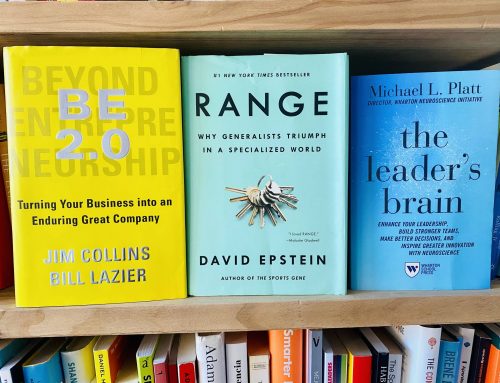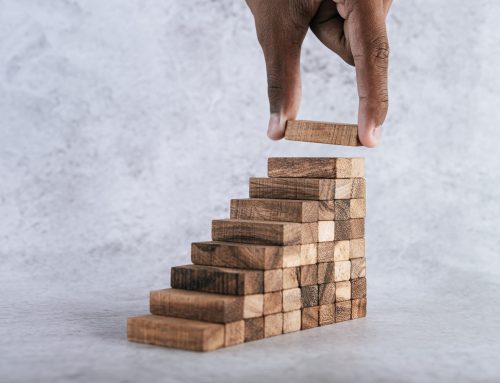Intentions help us dream, but it’s the actions that allow us to achieve these dreams.
Motivated by this difficult moment in which we find ourselves, I would like to share with you a few thoughts that I believe can be timely.
After a long hiatus due to my PhD, a second child, three house moves and the launch of my book Mejores Líderes (stay tuned for the English version coming up soon), I’m happily back and would like to share with you eight steps for moving towards action, based on five years of research and over a decade working with all sorts of team and people, from entrepreneurs, to professional athletes to boards of directors across many industries. 8 traits that help us become better professionals and leaders.
Which are these eight traits and how can they help us reach our best self?
Ready? Here we go:

-
Self-efficacy
What does it tell us?
That if you don’t think you have the capacity to undertake a task, you will be less likely to start it.
That what you studied doesn’t define who you are, it’s just your starting point.
Self-efficacy is related to your self-confidence. And this self-confidence depends a lot on how much you know yourself (self-awareness).
How to foster it?
- Through “flight hours”.
Practice hours give us small success moments and each of these success situations increases our self-confidence. A good book to dig into is Outliers, by Malcolm Gladwell. By the way, his twitter bio reads “Skinny Canadian”. It takes a lot of self-awareness to choose that bio…:)
2. Develop activities that are connected with your deep self .
Physical activity, yoga, meditation, mindfulness… Varios studies show that there is correlation between these activities and a higher self-efficacy (that was also one of my PhD findings).
3. Take some self-awareness tests.
They are free and they can help you see which aspects you want to work on.
4. Grow in another context.
Changing context (employer, city, country) helps us discover other parts of ourselves. And it makes you stronger (and more prepared) the day you want to return.
5. Ask yourself: “how did I solve this last time”? You will probably discover that if you were able to solve it in the past, you can do it in the future.
The more we talk about skills or competences, the more important it is to connect them with our life stories and experiences

-
Risk propensity
What does it tell us?
That managing risk is not doing more, it is doing better.
Successful entrepreneurs don’t risk more, they manage risk better, which is another thing. Is it riskier to become an entrepreneur or to work for a company? Being self-employed involves risks, but having just one employer can be riskier, as when we are self-employed we can work for several clients (=employers) and diversify our income.
Having risk doesn’t make you any less entrepreneurial. Caution is a virtue for any person, also for entrepreneurs. What’s important, however, is not to be paralyzed by it. Acting with caution, but acting.
How to train it?
Practising anticipation. It is important to change things when things are going well, because it is in that moment when we have the self-confidence to try something new. It also helps to constantly create opportunities by analyzing gaps that we can cover with our skills.
“Opportunity and risk come in pairs”
Bangambiki Habyarimana

-
Creativity
What does it tell us?
It is not a matter of being (creative or not) but doing (that our job allows us to implement new solutions to existing problems). Few people consider themselves creative but most of us are doing creative things every day.
What helps us to increase it?
- To have autonomy (feeling free to create and give an answer to our everyday challenges).
- To understand that decisions are rarely binary (yes or no, A or B), and opening a third option helps us reduce the impact of our decision. For instance, if you are managing two options such as “stay in my current job” and “accept the job offer”, think of incorporating a third one, such as “stay in my current job and ask for a salary raise, or a department change”. Or “stay in my current job and suggest the creation of a new position more aligned with my current interests.”
- To understand that it is easier to change rules from within. The best changes were achieved by people within their organizations. Plus, sometimes convincing a stubborn boss can be a good practice for your creativity..:)

-
Critical thinking
What does it tell us?
The more information available, the more important it is to foster critical thinking in what we read and see. We should question an idea deeeply before embracing it.
When we become critical thinkers, we improve as people, as an organization and as a society.
How to foster it?
Training it since we are little: teaching how to doubt, training the use of questions, fostering debate (in our family, workplace, with our spouse) and agreeing to disagree (the end goal of communication isn’t to agree but to understand).
Be aware that we all have cognitive biases that impact they way we see our world. Knowing that our mind also tricks us helps us understand better what happens around us.
“Don’t raise your voice, improve your argument”
Desmond Tutu

-
Tolerance for ambiguity
What does it tell us and how to increase it?
- It teaches us that starting losing doesn’t mean losing. In many occasions, we need to overcome difficult situations (COVID-19 is a good example of one) and these tough times become a great growth opportunity to show our best version, individually and collectively.
- That in times of uncertainty, it is not about making more changes, but rather making the right changes.
- That sometimes giving up is not only an option, but the smartest one.
Uncertainty provides us the opportunity to have a new project

-
Locus of control
What does it tell us?
That in order to connect with people, we must first connect with ourselves. And the higher our internal locus of control, the more tools we have to fight for what we want, to feel that we are in control of our lives.
How to foster it?
- Focusing on what we can control.
- Understanding that it is through discomfort that we grow. If you feel uncomfortable, you’re probably learning a lot.
- Understanding criticism as lever for growth.
- Being less tough on yourself.
- Asking for help.
“I am the master of my fate: I am the captain of my soul”
William Ernest Henley

-
Social impact
What does it tell us and how to increase it?
- That our zip code impacts more on our health than our genetic code.
- That, despite this, we have the possibility (and responsibility), to improve our context. To lead is to improve those around us.
- That sometimes we don’t need to seek somewhere better, but to improve where we are (our job, our neighborhood, our city…). We can all become change agents.
- Learning from best practices encourages us to generate our own. Who do you know in your environment that you are inspired by? And when are you going to invite them for coffee? (it can be a virtual one :).
When leadership adds social responsibility, it becomes a weapon of mass construction

-
Empathy
What does it tell us?
- That these seven traits need an eighth one, empathy, in order to be effective.
- That empathy isn’t putting yourself in their shoes; it is understanding the emotionality in their speech.
- That in order to develop empathy we must want to work on it. And for this we must be aware of our need to work on it (self-awareness again).
- That we think we can read emotions in other, but we do it really poorly.
- That new technologies and social media are catalysts of the positive (generating empathy) and the negative (acting against it).
- That the more empathetic leaders are with their workeers, the higher is the latters’ performance. Quoting Toni Nadal, Rafa Nadal’s long time coach, “Pressure works when it comes with a deep respect for the other person”, and that is empathy.
- That to generate an idea we should not start in the problem, we should start in the people. And that’s also empathy.
How to foster it?
- Being exposed to different contexts, as it allows us to see things that were invisible to our eyes before.
- Speaking with people you don’t share things in common with. Our professional and personal development will depend on our capacity to interact with people that think very differently from us. This can become a real training….
- “Fake it ’til you make it”. If you don’t ask, you won’t be interested. But if you ask, you might be interested.
- Being part of a community, a tribe.
- Comparing yourself…. with yourself. The question is not if you are an empathetic person, but if you can be more empathetic now than a year ago. It is through these small improvements that we can find the motivation to keep growing.
Empathy is the first stone of any project
If you want to know more about these traits, stay tuned by joining our monthly newsletter and besides receiving the latest trends in Management and professional development, I will inform you when the English version of the book is launched.
Mejores Líderes en Amazon (in Spanish)
Better leaders are people and organizations that are attractive to the rest, it is where people want to be, because of what they do, but especially because of who they are.
If you want to see more of it and/or practise your Spanish, check out the two links below:
Download the first chapter here, with a preface by Emilio Butragueño (Real Madrid): Empieza a leer Mejores Líderes
Audiobook version: Prólogo e Introducción y Capítulo 1: Autoeficacia Tu carrera no te define







Leave A Comment